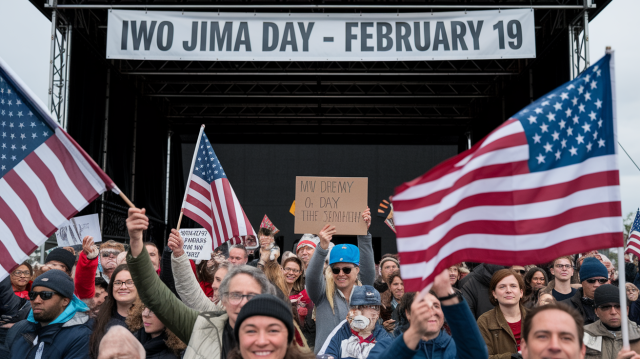Iwo Jima Day, observed annually on February 19, is a day of significance dedicated to honoring the bravery and sacrifice of the U.S. Marines who fought in the Battle of Iwo Jima during World War II. This pivotal battle, which lasted around five weeks in 1945, was one of the most intense and consequential conflicts of the war. The day serves as a solemn reminder of the courage displayed by those who fought and a reflection on the costs of war.
Why Is It Celebrated?
Iwo Jima Day is celebrated to commemorate the historic battle between U.S. Marines and Japanese forces on the island of Iwo Jima. The battle was marked by immense challenges, with thousands of lives lost on both sides. Despite these hardships, the U.S. Marines emerged victorious, symbolizing resilience and determination. The iconic image of Marines raising the American flag atop Mount Suribachi has since become a powerful symbol of unity, courage, and triumph.
The day also serves as an opportunity to honor war heroes, reflect on the sacrifices made during wartime, and emphasize the importance of peace by remembering the devastating consequences of war.
Cultural Significance
Iwo Jima Day holds deep cultural and historical meaning:
- Symbolism: The flag-raising at Mount Suribachi represents perseverance and national pride.
- Remembrance: It ensures that future generations understand the sacrifices made by those who served in one of history’s most grueling battles.
- Unity: The day brings together communities to honor shared values like bravery and service.
Communities observe this day through various activities:
- Visiting war memorials such as the Marine Corps War Memorial in Arlington, Virginia.
- Holding ceremonies or memorial services to pay tribute to fallen soldiers.
- Sharing stories and educating younger generations about the battle’s significance.
Social Impact
Iwo Jima Day strengthens bonds within communities by fostering a shared sense of gratitude and respect for military service members. It also raises awareness about the human cost of war, encouraging reflection on ways to promote peace and unity.
The Importance of It
Educational Value
Iwo Jima Day provides an opportunity to learn about World War II history, particularly the strategies, challenges, and outcomes of the Battle of Iwo Jima. Documentaries, books, and discussions offer insights into the heroism displayed during this critical moment in history.
Emotional Connection
The day evokes a deep emotional connection as people honor those who gave their lives for their country. Families with ties to veterans often share personal stories that highlight bravery and sacrifice.
The Origin of It
The observance of Iwo Jima Day stems from the historical significance of February 19, 1945—the start date of the battle. While officially recognized in Massachusetts, it is informally observed across the United States as a tribute to all who served during this pivotal conflict.
Historical Events
- February 19–March 26, 1945: The Battle of Iwo Jima takes place.
- Post-War Era: The iconic flag-raising photograph becomes a lasting symbol of American resilience.
- Modern Observances: Communities began marking February 19 as a day to remember this historic event.
Evolution Over Time
Initially focused on remembrance ceremonies, modern observances have expanded to include educational initiatives like documentaries and public discussions that ensure broader engagement with this chapter in history.
How to Celebrate
Here are meaningful ways to observe Iwo Jima Day:
- Visit Memorials: Pay your respects at local war memorials or visit prominent sites like the Marine Corps War Memorial.
- Watch Documentaries: Films such as Flags of Our Fathers or Letters from Iwo Jima provide powerful portrayals of the battle.
- Organize Ceremonies: Host or attend memorial services that include veterans’ stories or readings about the battle.
- Read Books or Articles: Expand your knowledge about Iwo Jima through literature or online resources.
- Thank Veterans: Express gratitude to veterans for their service through heartfelt messages or gestures.
Conclusion
Iwo Jima Day on February 19 is more than a commemoration—it’s a tribute to courage, sacrifice, and resilience. By honoring those who fought in one of World War II’s most defining battles, we ensure their legacy endures for generations. Whether through visiting memorials, learning about history, or simply thanking veterans for their service, this day reminds us all of the profound cost of freedom and the enduring value of unity.












